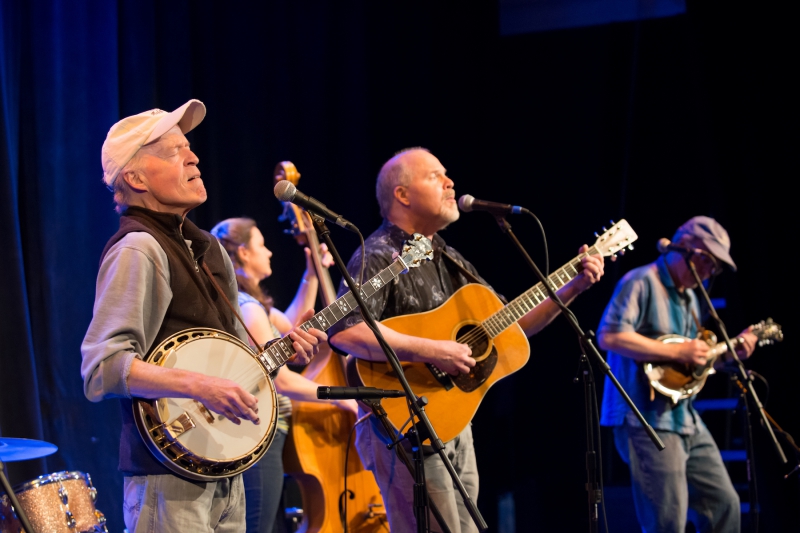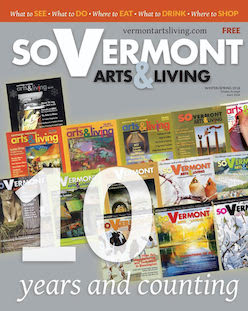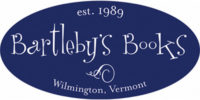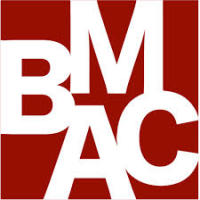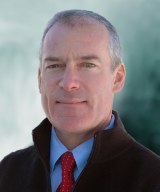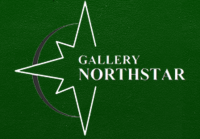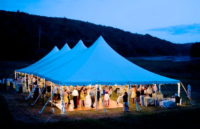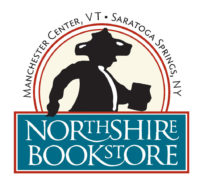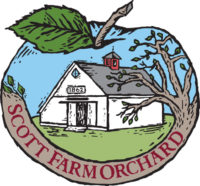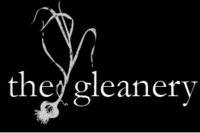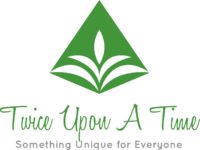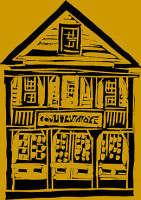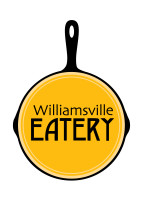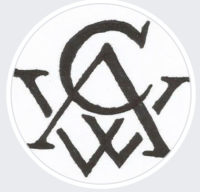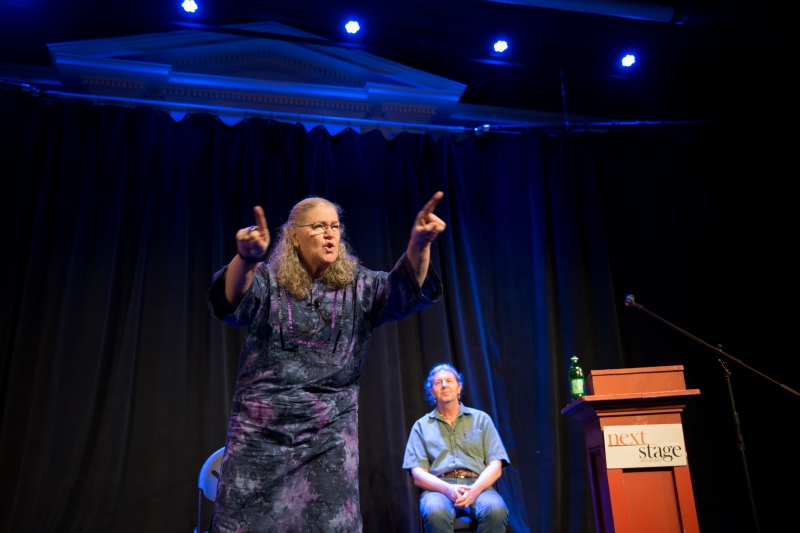
N∞tauau Kaukontuoh (“She Hears the Crow”), a woman of the Eastern Woodlands, lives her life in the tradition of the Nanhigganeˆuck, the people known today as the Narragansett, tells a story as part of “Indigenous Voices of the Land,” a storytelling performance that was part of the Legacy Putney series. Also on stage is David Lonebear Sanipass, a Native Mi’kmaq storyteller and master flute player.
By Elayne Clift
There was music ranging from contemporary bluegrass to folk, and a reunion of The Green Mountain Boys Band. There were Native American storytellers and Putney natives sharing oral histories. There was food, film, and dancing. There was also laughter and there were tears, along with lots of smiles and handclapping. It was a festival and a happening, and it all took place in the Vermont village of Putney over 10 days in May.
These events culminated a year-long celebration called Legacy Putney: A Collaboration of Putney’s Arts, History and Culture, an innovative project organized and produced by the Next Stage Arts Project in Putney.
The Legacy Putney project received several grants, including a $50,000 National Endowment for the Arts grant as part of NEA’s Our Town program that recognizes “creative placemaking” and “strategic links” to community residents, municipal businesses, cultural organizations, and local artists. A $40,000 grant from the Fresh Sound Foundation, a supporter of Next Stage since its inception, and a grant from the Harman Family Foundation also helped in producing the project.
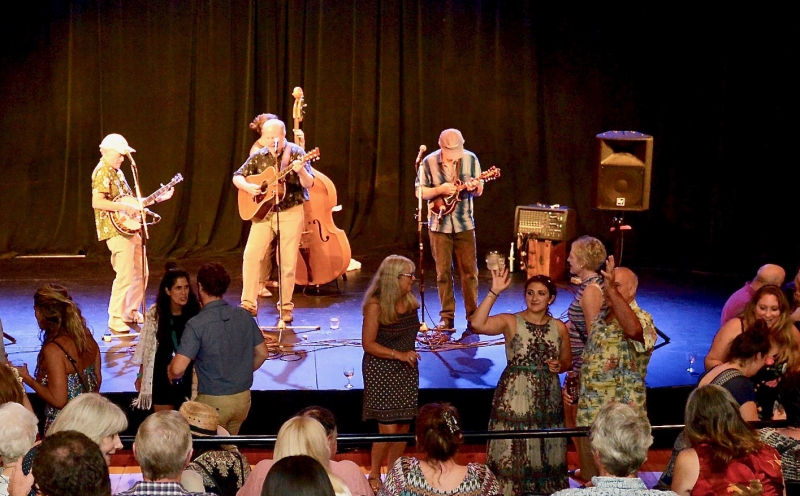
he Stockwell Brothers and Friends — musicians who are part of the fabric of Putney — perform at Next Stage Arts.
John Burt, a cultural philanthropist and producer who lives part time in Putney when he’s not working on cultural arts restoration projects in Cambodia, was instrumental as NSAP began articulating its vision for the community-based performing arts center. He appreciated NEA and ArtPlace America, another major donor, who “understood the need to bring the arts to Main Street in order to create community engagement. They knew there is more to supporting the arts than renovating a building,” he says.
The Legacy Putney project and celebration of community included literary, spoken word, and film events as well as wide-ranging music and dance performances, communal meals, and storytelling by and about Putney residents. NSAP executive director Maria Basescu, the driving force behind the project, sees it as representative of the Next Stage philosophy. “No matter what kind of art piece you do, there is creative expression of the human experience that is shared. We are all present for each other in the moment. That’s what art can do and it’s extremely powerful,” she says.
In preparation for the storytelling component, a two-day training workshop led by Murray Nossel, a community psychologist and founder of the organization Narativ, helped participants gather stories to be told during the project. Nossel, who began gathering legacy stories when he worked with AIDS patients, believes everyone has a story to tell and that there are effective and moving ways to tell our stories, which then have meaning for others.
Nossel became involved in Legacy Putney when he met John Burt, a founder of the Fresh Sound Foundation. “I realized Putney was an extraordinary place,” he recalls. “It’s a progressive community. People think about things in extraordinary ways. They got the sacredness of storytelling.” When Basescu asked him to design a storytelling project he jumped at the chance. “We started a movement in Putney!” he says. That movement provided a model for community building through the arts that helped define Next Stage, which began in a historic church turned theater in 2010.
Participants in Nossel’s training learned how to tell their own stories so that they could interview other community members whose stories of Putney life were also worth telling. It was “intensive and immersive,” one participant said. “We learned how to listen actively, without judgment, and how to tell a four-minute story in a way that conveys to listeners the importance of sharing what happened in their own lives.” In that way, a cadre of storytellers was developed, allowing the legacy of Putney to live on. Their stories are now archived at the Vermont Folklife Center in Middlebury, a nationally known venue for folklife education that uses ethnography and oral history to strengthen the understanding of cultural experience and the social fabric of diverse communities. It was an appropriate partner for NSAP’s Legacy Putney project. The two organizations had collaborated with local public schools in an oral history project that compiled interviews of local people which were also presented publicly.
Oral history, the basis for much of the festival, has unique and proven benefits. It allows listeners to learn about other people’s perspectives. As one blog proponent put it, it’s a “powerful way of connecting people, providing a way to tell history, and share with each other our own history more deeply. It provides rich opportunity for interaction and connection.”
Other collaborative partnerships previously established by NSAP with local organizations and individuals helped make Legacy Putney a success. The Yellow Barn and the Vermont Jazz Center, among other music venues, were key, as were the Apron Theater Company, New England Youth Theatre, and Sandglass Theater. Educational institutional partners included The Putney School, Landmark College, Vermont Academy, and Marlboro College. Vermont Performance Lab, the Putney Historical Society, and the Town of Putney all got onboard early and enthusiastically.
Each of the participating organizations and individuals who came together to make Legacy Putney possible and vibrant were deeply committed to actively engaging members of the community. “We sought to engage people in the community who may have not traditionally seen themselves in relation to the arts. Some of them might have perceived culture as elitist. But their stories are an essential part of the fabric of our history as a community,” Basescu explains.
There seems no doubt that Next Stage Arts Program, through its exciting Legacy Putney project and future initiatives, will be a beacon of inspiration for communities everywhere as they build their own connections through the arts. NSAP has joined other notable venues that serve as successful models of placemaking, community building, and innovation via the performing arts, all catalysts for social change.
As Basescu put it when reflecting upon the successful festival, “We celebrated a community rich with an unparalleled spirit of collaboration and the understanding that our wellbeing is fundamentally interconnected.”
It’s a gift she and everyone connected to NSAP are eager to share.
Elayne Clift, a writer in Saxtons River, Vt., is a member of the Program Committee at Next Stage. In addition to the arts, she writes about women, health, politics, and social issues.


